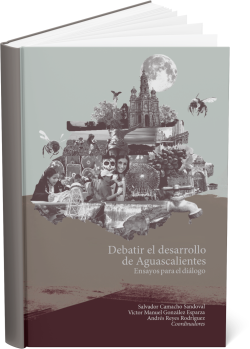Discussing the development of Aguascalientes: Essays for dialogue
Keywords:
Debate, Development of Aguascalientes, Generational changes in Aguascalientes, Conservation of natural resources, Water security, Public policies, Urbanization study, Urban space distribution, Urban mobility, Aguascalientes economy, Industrialization of Aguascalientes, Foreign investment, Automotive sector, Technology sector, Working poverty, Informal employees, Democratic development in Aguascalientes, Citizen participation, Transparency and anticorruption, Cultural changes in Aguascalientes, Dialogue, Recognition of plurality, Aguascalientes demographics, Women's participation, Participation of non-binary groups, Educational challenges of Aguascalientes, Social progressSynopsis
A little more than thirty years ago, on the occasion of the state development plan for the government of Otto Granados Roldán, a group of experts coordinated by Claudio H. Vargas met at Casa Terán in this city, to discuss the challenges facing the state of Aguascalientes, so it is important to recognize their findings at that time.
After a generation and five governorships, some of the experts of that time, together with other participants, decided not to repeat the previous exercise, since it is not a question of elaborating a development plan, but of analyzing with critical eyes the central issues facing the government and society as a whole.
In this sense, the present book is an effort coordinated by Salvador Camacho Sandoval, Víctor M. González Esparza and Andrés Reyes Rodríguez, with the purpose of giving an account precisely of some of the changes that have occurred in Aguascalientes during the last generation in historical terms (every 20 or 25 years), but also of the structural problems on which little progress has been made, such as the conservation of natural resources together with local flora and fauna, urban efficiency and mobility, economy and employment, democratic exercise, cultural progress, state demographic characteristics, the participation of women and members of other minorities in public life, and the educational and teaching situation at each level.
All the essays gathered here coincide in a proposal that is demanded by civil society as a whole: the generation of new public policies that contribute, from the institutions, to a sustainable development, that improves the quality of life of the population, and that given the social and political polarization, spaces can be built for a greater dialogue between society and between society and governments. It is not only a matter of finding the dark side of everything, but of making it possible to have inclusive institutions that can attend to an increasingly diverse population that needs to be heard in its plurality.
Chapters
-
Introduction
-
Natural systems
-
Aguascalientes, water management and sustainable development from the adaptive governance approach
-
Power, access and management of natural resources in the peri-urbanization of Aguascalientes, 1990-2020
-
Formal urban planning principles and the city of Aguascalientes
-
The economy of Aguascalientes, challenges for the 21st centuryOpportunities for a new economic policy paradigm
-
Impoverished labor in Aguascalientes
-
Improving democratic development in Aguascalientes
-
Culture and society in Aguascalientes
-
Aguascalientes: demographic dynamics and social progress
-
The statistical footprint of women in Aguascalientes
-
Education in Aguascalientes, the gap between duty and facts
-
General conclusions

Downloads
Published
Series
Categories
License

This work is licensed under a Creative Commons Attribution-ShareAlike 4.0 International License.






